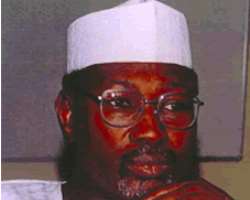2011: JEGA RAISES FRESH FEAR OF VIOLENCE

Jega
Still smarting from the shut-up order handed him by the Senate, the Chairman of the Independent National Electoral Commission (INEC), Prof. Attahiru Jega, yesterday raised a fresh alarm over the threat posed by the state of insecurity in the land to the 2011 general elections.
The INEC Chairman had earlier been advised to talk less and face his duties by the Senators following his allegation that the lawmakers were delaying his preparation for the polls with the delay in the passage of the fresh amendment of the Electoral Act.
Away from complaints over the seeming delay in the amendment of the extant laws to allow for time line extension, the INEC boss said the prevailing situation of insecurity portends danger for the smooth conduct of the elections except measures are taken to curb crime rate.
Worse still, Jega who was speaking in Abuja at the opening of a two-day workshop on 'Security challenges of Election Management: Toward Nigeria's 2011' in collaboration with the Friedrich Ebert Stiftung Foundation, said the prevention of violence during the election was beyond his commission and yet, he had promised he would not fail Nigerians.
As Jega was lamenting the situation in which security issues have remained persistent features of election management in the country, the police warned politicians, saying they either obey the law or face the wrath of the force as it was not ready to allow a repeat of ugly incidence of violence that had been the bane of credible elections in Nigeria.
The INEC Chairman explained that he was worried over the spate of kidnappings, abductions, and other forms of insecurity because statistics have revealed that apart from the scourge of HIV/AIDS, deaths from political killings have come second.
According to him, 'some recent security developments have now placed security issues on the front burner as we strategize for the 2011 polls. The threats to security are many especially in terms of recent developments in our national life; abductions, and other forms of insecurity. The competing demands on our resources send a sense of trepidation and news reports about arms build-up and arms proliferation is frightening to even the hardened mind'
'We have promised Nigerians free, fair and credible elections in 2011. The expectations are high and these are justifiable in view of our recent history, the high level of trust reposed in us as a Commission and the benefit of doubt that Nigerians have generously conceded to us as a Commission.'
The INEC helmsman argued that in the light of this, he could not afford to fail not just Nigerians but the world at large. However, 'these imponderable security challenges and threats are beyond us as a Commission. As we move toward 2011 general elections, all of us must pose serious questions on how to play positive roles in ensuring their success.'
He said the wave of democratization sweeping across the world has made elections and election management issues of both national and international concern, adding that beginning from Benin Republic in 1991 through to other countries, concerns about providing the minimum conditions in which voters/citizens could discharge their basic obligations without let or hindrance have been firmly placed on global discourse on security.
Earlier, the Inspector-General of Police (IGP), Hafiz Ringim, warned that men and officers of its formations would deal with all trouble-makers in the 2011 elections, noting that the police were poised to surmounting all perceived security challenges which might hamper the peaceful conduct of the elections.
The IGP, who was represented by his Deputy in charge of B department, Audu Abubakar, said government has restated its resolve to conduct free and fair elections and therefore, the Police have a key role to play in guaranteeing the peaceful conduct of the polls.
The police boss stated that the force was ready to provide a level playing ground to all participants in the elections through adequate security.
He therefore, urged all those involved in the electoral process either directly or indirectly, to be law-abiding 'as the police will not hesitate to deal with offenders irrespective of their political affiliations or social standing.
The IGP assured the INEC that the police were ready to collaborate with it and all other stakeholders in ensuring an all round success in the forthcoming elections.
In his remark, the Resident Representative of the Foundation, Thomas Mattig, said Nigerians and the world are looking upon the 2011 elections with much hope and anxiety.
'Free, fair and peaceful elections would send strong signal that the democracy is firm in Nigeria and we are confident about the determination of the INEC Chairman to deliver' , he stated.
He lamented that electoral violence shocked Nigeria in 2007 and fears continued to rise that the country might again face vicious power struggles in 2011. 'Nigeria is not alone with these challenges. Worldwide, young democracies or transitional regimes, elections, can create precarious situations that threaten stability, particularly when an incumbent is forced out of power'
Mattig noted that there were good examples that Nigeria could emulate, citing Ghana and South Africa as the most prominent examples and 'as we see, many countries have developed successful mechanisms to prevent election dispute from escalating. This way, even under difficult circumstances, elections can become a catalyst for peace and stability.'
